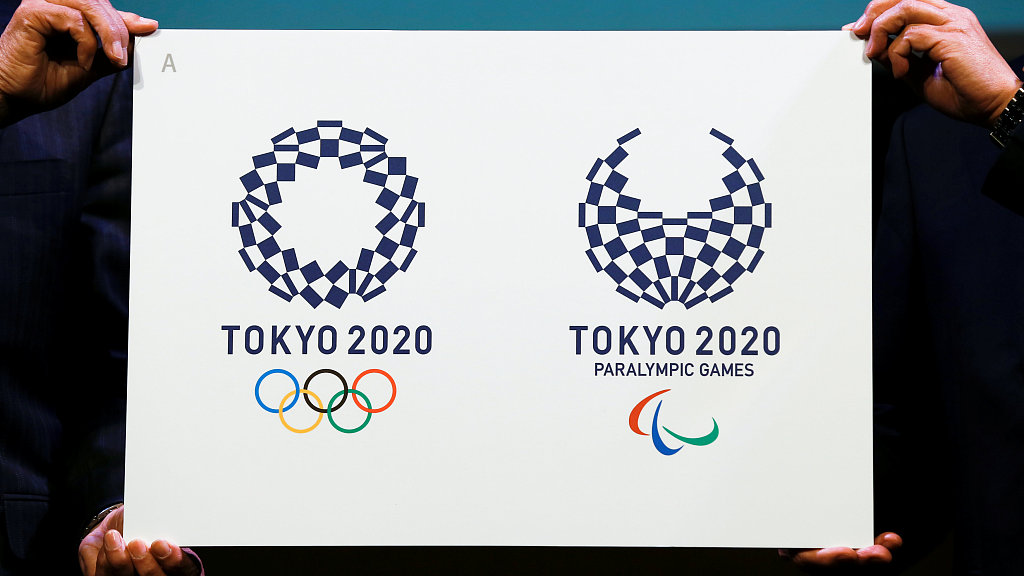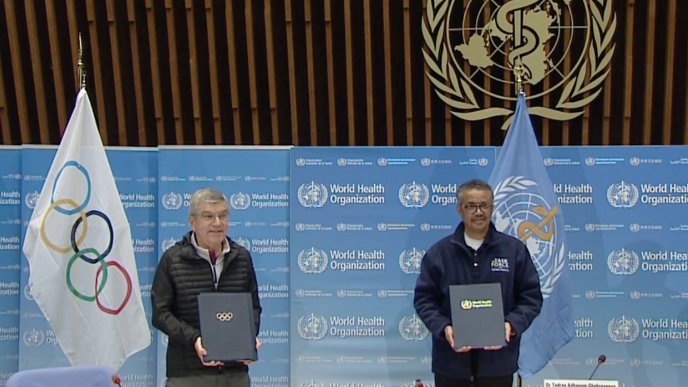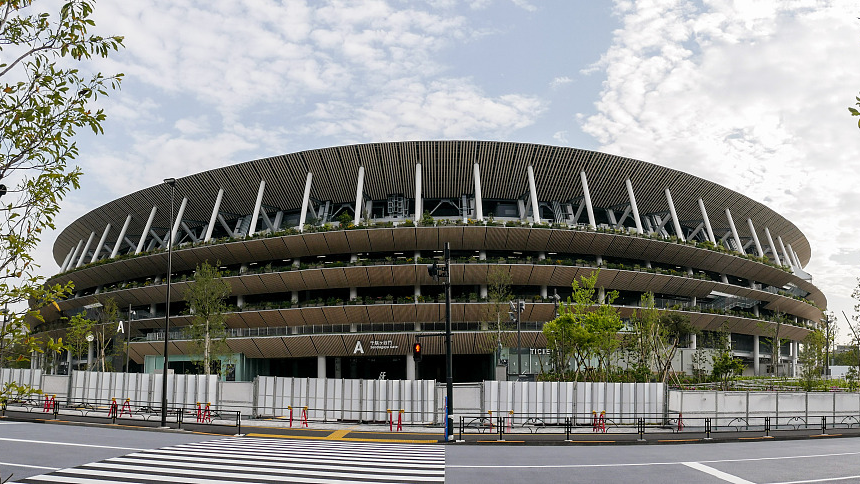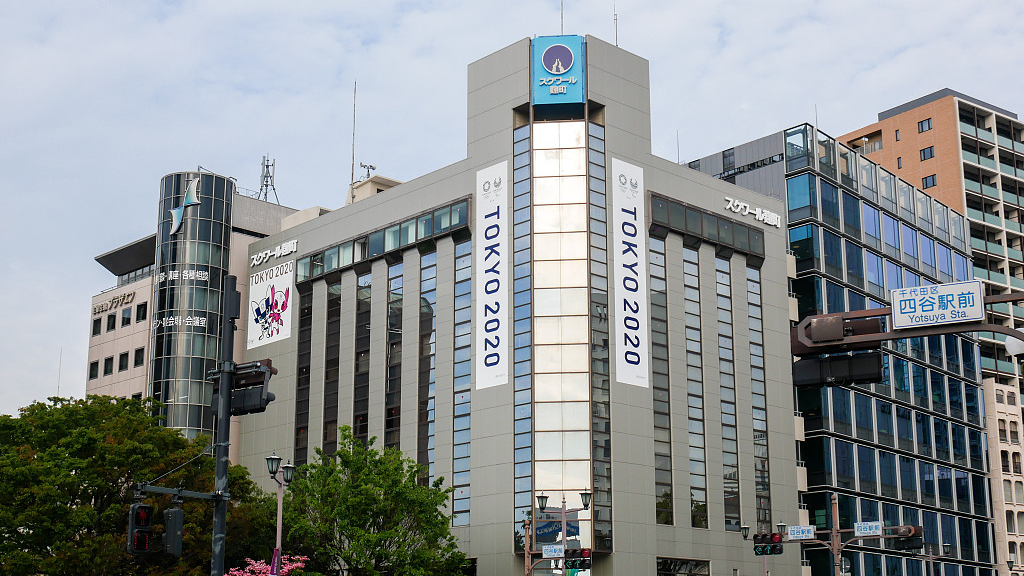The International Olympic Committee (IOC) President Thomas Bach said he understands why the rescheduled Tokyo 2020 Games would have to be cancelled if they cannot take place next summer.
"You cannot forever employ 3,000 or 5,000 people in an organizing committee," Bach said in a wide-ranging interview with BBC Sport on Wednesday.
"You cannot every year change the entire sports schedule worldwide of all the major federations. You cannot have the athletes being in uncertainty."
According to Bach, Japan's Prime Minister has made it very clear to him that "Japan could not manage a postponement beyond next summer at the latest." And for that, Bach said he had some understanding.
"You cannot have so much overlapping with a future Olympic Games, so I have some understanding for this approach by our Japanese partners."

The winning design of the Tokyo 2020 Olympic Games and Paralympic Games' emblems presented during its unveiling ceremony in Tokyo, Japan, April 25, 2016. /VCG
The winning design of the Tokyo 2020 Olympic Games and Paralympic Games' emblems presented during its unveiling ceremony in Tokyo, Japan, April 25, 2016. /VCG
Relying on the advice of WHO
Last Saturday, a new Memorandum of Understanding was signed by IOC's President Thomas Bach and World Health Organization (WHO) Director-General Tedros Adhanom Ghebreyesus at the WHO headquarters in Geneva.
During the signing ceremony, Bach said he was thankful of the WHO's "most valuable advice" which they provided starting this February with regards to the Tokyo Olympics and was proud the IOC can continue counting on their advice in organizing the postponed Games in a safe environment.
Bach stressed this trust again when asked if he agreed with Japan's Prime Minister Shinzo Abe admitting it may be "difficult" to stage the Games if the country does not successfully contain the virus, and the head of the Japan Medical Association suggesting it depends on finding a vaccine.

International Olympic Committee President Thomas Bach and World Health Organization Director-General Tedros Adhanom Ghebreyesus pose for a photo with the signed Memorandum of Understanding in WHO headquarters in Geneva, Switzerland, May 16, 2020. /VCG
International Olympic Committee President Thomas Bach and World Health Organization Director-General Tedros Adhanom Ghebreyesus pose for a photo with the signed Memorandum of Understanding in WHO headquarters in Geneva, Switzerland, May 16, 2020. /VCG
"For this question, we are relying on the advice of the World Health Organization," Bach said.
"Nobody knows what the world will look like in one year, in two months. So we have to rely on [experts] and then take the appropriate decision at the appropriate time based on this advice."
At the same time, Bach admitted the job of reorganizing the Games "a mammoth task".
"We have to be prepared for different scenarios. At the same time, looking at the scenarios this may require towards the organization, with regard to health measures, these maybe need quarantine for the athletes, for part of the athletes, for other participants."

General view of the new national Olympic stadium in the Shinjuku district, in Tokyo, Japan, April 23, 2020. /VCG
General view of the new national Olympic stadium in the Shinjuku district, in Tokyo, Japan, April 23, 2020. /VCG
"All these different scenarios are under consideration and this is why I'm saying it's a mammoth task, because there are so many different options that it's not easy to address them [now]. When we have a clear view on how the world will look on 23 July, 2021, then [we will] take the appropriate decisions," said Bach.
The Games will focus on essentials
The IOC has already set aside an 800 million U.S. dollar Olympics fund to help with the severe financial impact caused by the postponement of Tokyo 2020. But according to Bach, there would also have to be cutbacks to the Games.
"They will definitely be different, and they have to be different," he said. "If we all have learned something during this crisis, [it is] to look to the essentials and not so much on the nice-to-have things."
"So this concentration on the essentials should be reflected in the organisation of these Games... there should be no taboo."

A general view of the emblem for the Tokyo 2020 Olympic Games in the Shinjuku district, in Tokyo, Japan, April 23, 2020. /VCG
A general view of the emblem for the Tokyo 2020 Olympic Games in the Shinjuku district, in Tokyo, Japan, April 23, 2020. /VCG
Last weekend saw the German Bundesliga resume without fans allowed at the stadiums. If social distancing restrictions are still in force in Japan next summer, the Games may also have to face the same situation as suggested by some.
Bach said such the scenarios of staging the Games behind closed doors remained "speculation".
"This is not what we want," he said. "Because the Olympic spirit is about also uniting the fans and this is what makes the Games so unique that they're in an Olympic Stadium, all the fans from all over the world are together."
"But when it then would come to the decision... I would ask you to give me some more time for consultation with the athletes, with the World Health Organization, with the Japanese partners."